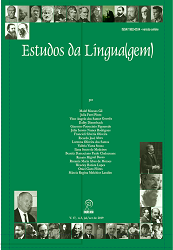The lexis as a linguistic resource for the production of meaning in texts: a case study with probe protocols
DOI:
https://doi.org/10.22481/el.v17i3.5928Keywords:
Léxico. Protocolos de investigação. Linguística sistêmico-funcional.Abstract
This paper investigates how lexis is constructed in text through two case studies grounded on Systemic Functional Linguistics (SFL). SFL models the interdependence between grammar and lexis as the former being the most delicate version of the latter. Aiming at investigating complementary properties between grammar and lexis, the paper carries out a case study by compiling a corpus of academic articles and popular science articles about Diabetes Mellitus. Two lexical research protocols were applied to the corpus. The results indicate that the systemic choices in the two socio-semiotic processes were different despite keeping the experiential domain. In addition, the lexical status of a language item depends on its potential to establish taxonomic relations of identification and classification, thus becoming part of a process of generalization.
KEYWORDS: Lexis. Probe protocols. Systemic-functional linguistics.
Downloads
References
BIBER, Douglas; JOHANSSON, Stig; LEECH, Geoffrey, CONRAD, Susan; FINEGAN, Edward. Longman Grammar of Spoken and Written English. England: Pearson education, 1999.
BIDERMAN, Maria Tereza Camargo. Léxico e vocabulário fundamental. Alfa, São Paulo, v. 40, p. 27-46, 1996. Disponível em: <https://repositorio.unesp.br/bitstream/handle/11449/107739/ISSN1981-5794-1996-40-27-46.pdf?sequence=1&isAllowed=y>. Acesso em: 20/10/2018
BRINTON, Laurel J. TRAUGOTT, Elizabeth C. Lexicalization and Language Change. Cambridge: Cambridge University Press, 2005. 207 p.
CHOMSKY, N. Aspects of the thoery of syntax. Cambridge: MIT Press, 1964.
CHOMSKY, Noam. Remarks on nominalization. In: JACOBS, R. A. & ROSENBAUM, P. S., ed. Readings in English transformational grammar. Waltham, Mass., Ginn. 1970. p. 184-221.
DI SCIULLO, A-M; WILLIAMS, E. On the definition of word. Cambridge: MIT, Press, 1987.
FREITAS, G.A.; SOUZA, M. C. C.; LIMA, R. C. Prevalência de diabetes mellitus e fatores associados em mulheres indígenas do Município de Dourados,Mato Grosso do Sul, Brasil. Cadernos de Saúde Pública, Rio de Janeiro, v. 32, n. 8, p. 1-12, 2016.
GITHUB. Disponível em: https://github.com/stopwords-iso/stopwords-pt. Acesso em: 21/10/2018
HALLIDAY, M. A .K. 'Text as Semantic Choice in Social Contexts'. In: Van DIJK, T.; PETOFI, J. (Eds.) Grammars and Descriptions. Berlin/ New York: de Gruyter. 1977. p. 176-225.
HALLIDAY, M. A. K. On grammar. In: HALLIDAY , M. A. K. The collected works of M.A.K. Halliday. v. 1. London: Continuum, 2002.
HALLIDAY, M. A. K.; MATTHIESSEN, C. Construing experience as meaning: a language based approach to cognition. London: Cassell,, 1999.
HALLIDAY, M. A. K.; MATTHIESSEN, C. M. I. M. 2014. An introduction to functional grammar. London, 2014.
HASAN, R. Ways of Saying: Ways of Meaning. [S.l.]: Cassell, 1996.
SUPERINTERESSANTE. Disponível em: https://super.abril.com.br/ Acesso em: 21/10/2018
MARTIN, J. R. English Text System and Structure. Philadelphia: John Benjamins Publishing Company, 1992.
LEHMANN, Christian. New reflections on grammaticalization and lexicalization. In: WISCHER, Ilse & DIEWALD, Gabriele (eds.), New reflections on grammaticalization. Amsterdam: John Benjamins, 2002, p. 1-18.
MARTIN, J.; ROSE, D. Working with discourse: meaning beyond the clause. 2. ed. London: Continuum, 2007.
MARTIN, J. Systemic functional grammar: a next step into the theory – axial relations. Beijing: Higher Education Press, 2013.
MATTHIESSEN, C. Lexicogrammatical Cartography: English Systems. Tokyo: International Language Sciences Publishers, 1995.
MATTHIESSEN, C. Applying systemic functional linguistics in healthcare contexts. Text and Talk, v. 33, n. 4–5, p. 437–466, 2013.
MATTHIESSEN, C.; TERUYA, K.; LAM, M. Key terms in systemic functional linguistics. London and New York: Continuum, 2010.
QUIRK, R. LEECH, G; GREENBAUM, S. 1985. A Comprehensive Grammar of the English Language. London: Longman, 1985.
RÖMER , U.; SCHULZE, R. Exploring the Lexis-Grammar Interface. Philadelphia: John Benjamins Publishing Company, 2009.
RÖMER, Ute; SCHULZE, Rainer. Introduction: Zooming in. In: RÖMER, Ute; SCHULZE, Rainer. Exploring the Lexis–Grammar Interface. John Benjamins Publishing Company: Amsterdã, 2006.
SAUSSURE, F. Curso de Linguística Geral. São Paulo: Cultrix, 2006.
TUCKER, G. H. 1998. The Lexicogrammar of Adjectives A systemic functional approach to lexis. Londres: Cassel, 1998.
URE, J. Lexical density and register differentiation. 1971. In: PERREN, G. E.; TRIM, I. L. M. (Ed.). Applications of linguistics. Cambridge: Cambridge University Press, 1971. p. 443-452.
Downloads
Published
How to Cite
Issue
Section
License

Estudos da Língua(gem) is licensed under a Creative Commons Attribution 4.0 International License.
Authors who publish in the journal Estudos da Língua (gem) agree with the following terms:
The journal Estudos de Língua(gem) maintains the copyrights of the contributions published. These rights include the publication of the contribution and make its content available for free through the portal.







